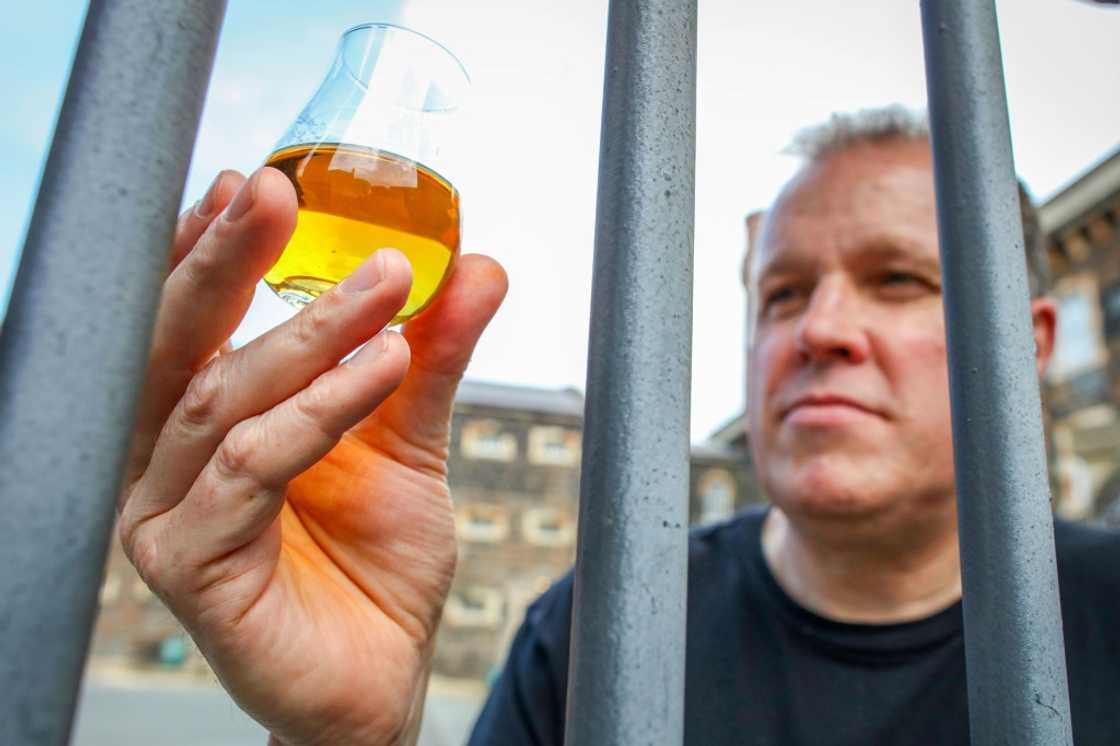Behind bars: Belfast jail reborn as whiskey distillery

Source: AFP
Once home to paramilitary prisoners during Northern Ireland's "Troubles", a notorious Belfast jail is now home to a whiskey still that is drawing tourists to a formerly strife-torn area.
For Graeme Millar, master distiller at McConnell's Whisky, the repurposed Crumlin Road Gaol, whose four forbidding Victorian granite wings are still surrounded by high fences, is an "iconic part of Belfast's history".
"We want to do it justice, by bringing distilling back to Belfast and into a building of such significance," the 53-year-old told AFP.
"It feels very calm and peaceful for me when I come to work in the morning. I'm sure it's very different from what it used to be like when it was a prison," he said.
The Troubles claimed over 3,500 lives during three decades of sectarian violence over British rule of Northern Ireland, which largely ended in a 1998 peace deal.
For many Northern Irish people, Crumlin Road Gaol -- located in the northwest of the city which was an epicentre of the conflict -- was associated with riots, bombings and breakouts.
"I would have driven here with my mum and dad as a child and would have seen the barriers up at the front and the big tall fences, I remember those sights," said Millar, who grew up near the city.
Whiskey revival
Since closing in 1996 the prison's A-wing lay derelict but reopened in April after a £30 million ($40 million) joint investment by the US-backed Belfast Distillery Company and the UK government.
The prison's thick stone walls and rows of cramped cells along gangways presented "a challenge" when fitting the distillery into the space, according to Millar.
"Small rooms to put things like air compressors into work well, but something like grain handling equipment which should be outside needed to be fitted into a few cells over the course of three floors," he said.
The firm now provides jobs for over 30 people, including distillers and tourism staff at a brand new visitors centre.

Source: AFP
It has also resurrected both a long dormant brand -- "McConnell's Irish Whisky" that dates back to 1776 -- and is helping revive whiskey-making in Belfast, which died in the 1930s after Prohibition in the United States.
"We are bringing employment and distillation skills that haven't been used in Belfast for years," said Millar.
'Building on history'
"We're not the first whiskey distillers in this prison though," Ross Wade, a tour guide, told a group of English tourists from Nottingham.

Source: AFP
"The prisoners used to make their own home brew with fermented fruit, crackers and yeast, but their speciality wouldn't be as nice as our whiskey," laughed Wade, 27.
Opened in 1846, more than 25,000 people were incarcerated there including "suffragette" women's rights activists, pro-Irish unity republican and pro-UK loyalist paramilitary prisoners, as well as murderers and petty crooks.
Famous inmates included former Irish president Eamon de Valera and ex-IRA commander Martin McGuinness, who became Northern Ireland's deputy premier after the Troubles ended.
The jail -- colloquially known as the "Crum" -- opened its doors as a tourist attraction in 2012 and the firm hopes the distillery will draw even more visitors.
Wade said it complements other major sights in the city such as the museum commemorating the doomed Titanic liner which was built in Belfast.
"We are expecting to get roughly 100,000 people annually here, especially in the high season when the cruise ships and coaches come into Belfast," he told AFP.
One tourist, Simon Simmons, said the prison distillery was "definitely a great experience".

Source: AFP
"Being from the mainland UK we had definitely heard of the Troubles in Northern Ireland," said the 54-year-old IT manager.
"We hadn't necessarily heard of this prison itself but we were aware of what was going on as we grew up. It's good that that history is being built upon," he said.
PAY ATTENTION: Stay informed and follow us on Google News!
Source: AFP




